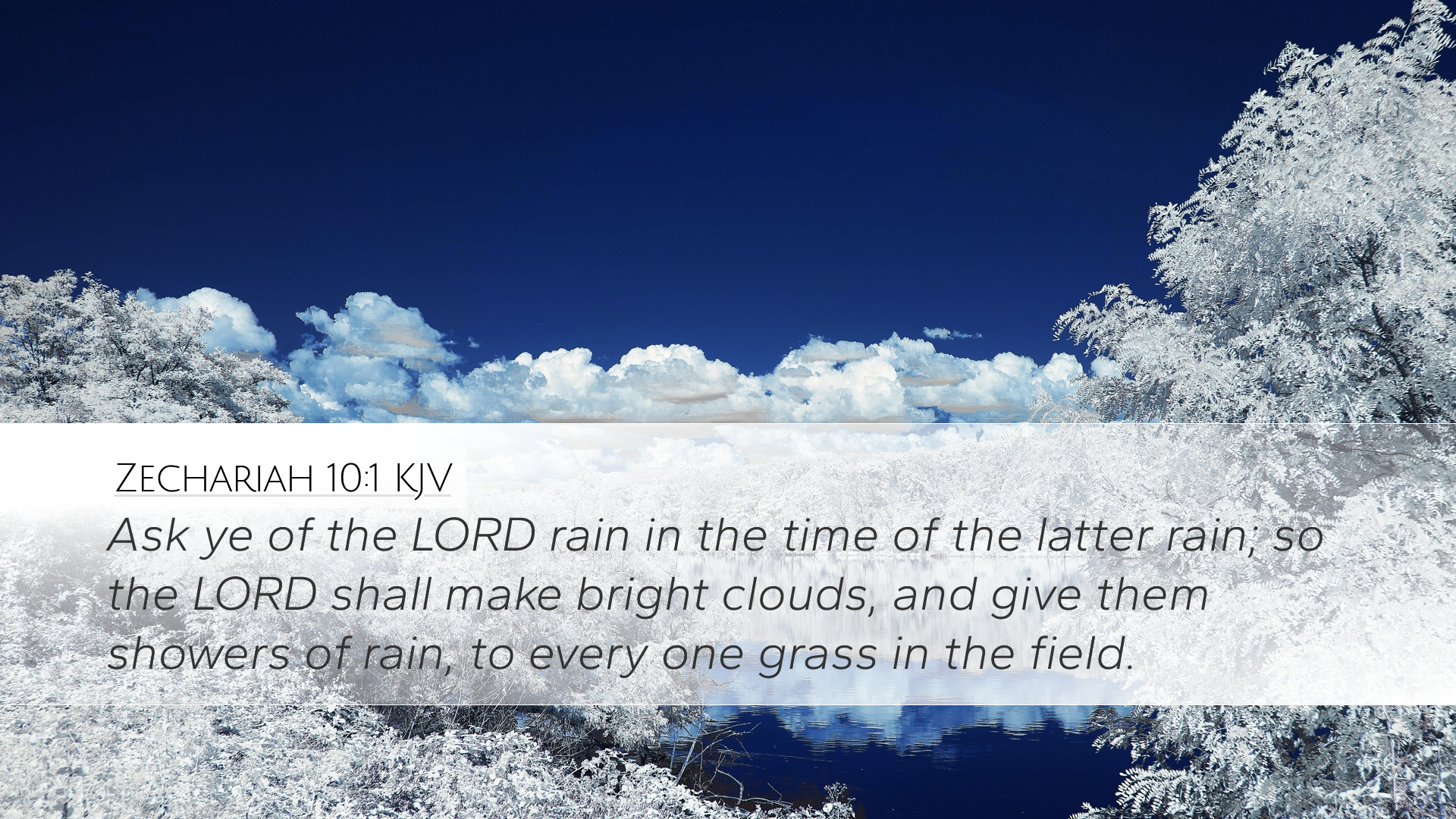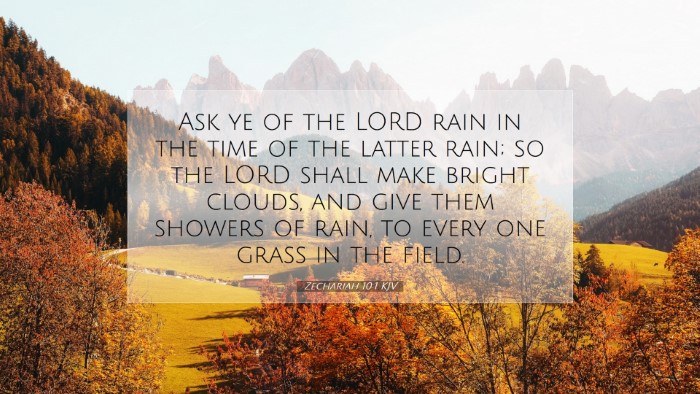Old Testament
Genesis Exodus Leviticus Numbers Deuteronomy Joshua Judges Ruth 1 Samuel 2 Samuel 1 Kings 2 Kings 1 Chronicles 2 Chronicles Ezra Nehemiah Esther Job Psalms Proverbs Ecclesiastes Song of Solomon Isaiah Jeremiah Lamentations Ezekiel Daniel Hosea Joel Amos Obadiah Jonah Micah Nahum Habakkuk Zephaniah Haggai Zechariah MalachiZechariah 10:1
Zechariah 10:1 KJV
Ask ye of the LORD rain in the time of the latter rain; so the LORD shall make bright clouds, and give them showers of rain, to every one grass in the field.
Zechariah 10:1 Bible Commentary
Commentary on Zechariah 10:1
Verse Reference: Zechariah 10:1 - "Ask ye of the LORD rain in the time of the latter rain; so the LORD shall make bright clouds, and give them showers of rain, to every one grass in the field."
Introduction
Zechariah 10:1 serves as a pivotal verse that encompasses themes of divine providence, prayer, expectation, and restoration. This commentary will explore insights derived from public domain commentaries, including those by Matthew Henry, Albert Barnes, and Adam Clarke, presenting a multi-faceted understanding suitable for pastors, students, theologians, and Bible scholars.
Contextual Background
The Book of Zechariah was written during a time of restoration for the Jewish people after their Babylonian exile. It speaks to the hope and promises of God concerning His people, the future Messiah, and the ultimate restoration of their fortunes. This chapter emphasizes the importance of reliance on God for physical and spiritual sustenance.
Analysis of the Verse
Prayer and Divine Provision
Zechariah invites the people to ask for rain, which symbolizes both physical and spiritual blessings. Rain, especially during the agricultural seasons, was crucial for the sustenance of the land. Matthews Henry emphasizes that this request reflects not just a desire for physical sustenance but also spiritual renewal and the outpouring of God's blessings upon His people.
The Significance of "Latter Rain"
Latter rain refers to the rain that falls in spring as the crops mature. Albert Barnes notes that this is a metaphor for the blessings of spiritual revival that God promises to His people. It signifies the latter days of the Church when the Spirit of God will be poured out abundantly, enhancing the harvest of souls.
Bright Clouds and Showers of Rain
The imagery of "bright clouds" indicates the promise of visible signs of God’s favor. Adam Clarke remarks that the ‘bright clouds’ symbolize the presence and glory of God, suggesting that He will not just provide rain, but will do so in a glorious manner that reveals His power and faithfulness.
Spiritual Implications
This verse carries profound spiritual implications, particularly regarding the relationship between prayer and divine blessing. The act of asking signifies humility and dependence on God. It teaches that believers ought to recognize their need for His provision.
Encouragement to Pray
Henry elucidates that this verse serves as an encouragement for the faithful to pray earnestly and expectantly. The invitation to "ask" suggests that God is ready to give, awaiting the petition of His people. This underscores the importance of cultivating a habit of prayer, particularly for spiritual revival.
Faith in God’s Promises
Barnes reflects upon the assurance that God's response will be generous and abundant. The phrasing "shall make bright clouds, and give them showers of rain" provides a guarantee of His faithfulness. It encourages believers to trust in the promises of God for both their physical needs and spiritual growth.
Application for Today’s Believers
In contemporary settings, this verse can be applied as a call to action for believers to actively seek God's blessing in their communities and churches. The need for prayer remains vital in seeking God's guidance and sustenance.
Community and Corporate Prayer
This verse serves as a reminder of the power of corporate prayer. Clarke suggests that believers should come together to pray for revival, much like the early church did. The pouring out of God’s Spirit is often linked to communal seeking of His presence, leading to communal transformation and revival.
Expectation of God’s Response
The expectation that God will provide "showers of rain" cultivates a culture of faith among believers. It reminds them that their petitions are not in vain and emphasizes the character of God as a giver of good gifts. Faithful prayer must be accompanied by an attitude of expectancy.
Conclusion
Zechariah 10:1 encapsulates a wealth of insights regarding the relationship between prayer, divine provision, and the anticipation of God’s blessings. Through the combined insights of public domain commentaries, we see that this verse challenges believers to engage earnestly with God, seek His favor, and anticipate the fruits of His blessings in their lives and communities.


